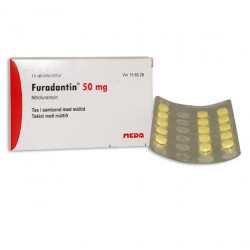Furadantin (nitrofurantoin) Coupons, Discounts & Cost
Furadantin (nitrofurantoin) belongs to the group of nitrofurans. One way to save money on the Furadantin (nitrofurantoin) retail cost regardless of income and insurance status is to use Furadantin coupons or discount cards from RXCoupons. Use our Nitrofurantoin coupons at your online pharmacy and receive up to 75% off the sale price each time you refill your prescription.
Why do you need to take Furadantin (nitrofurantoin)?
Furadantin (nitrofurantoin) belongs to the group of nitrofurans. This is an antimicrobial agent with bacteriostatic and bactericidal effect. Nitrofurantoin is highly active against gram-negative and gram-positive bacteria such as Streptococcus spp., Staphylococcus spp., Salmonella typhi and Salmonella paratyphi, Escherichia coli, Enterobacter, Proteus, Shigella sonnei.
Furadantin has the following indications for use: treatment of infectious and inflammatory diseases of the urinary tract caused by microorganisms sensitive to nitrofurantoin (pyelitis, pyelonephritis, urethritis, cystitis), prevention of infectious diseases during urological surgery, cystoscopy, catheterization. It is effective in diseases caused by germs resistant to chloramphenicol and other drugs.
When Furadantin (nitrofurantoin) is contraindicated?
Do not use this drug in case of hypersensitivity to nitrofurantoin, chronic heart failure, chronic renal failure, cirrhosis of the liver, chronic hepatitis, acute porphyria, during pregnancy or lactation.
How to use Furadantin (nitrofurantoin)?
Furadantin suspension should be taken during the meals, with water. The bottle should be shaken well before use. The suspension can be mixed with milk, water or fruit juice (to reduce discomfort in the stomach and intestines).
The usual safe dose is 100-150 mg 3-4 times a day, for 7-10 days. Doses for children: 5-8 mg/kg per day (3-4 doses per day). The maximum daily dose is 600 mg. The maximum single dose is 300 mg. The average length of treatment is about 7 days.
Furadantin should not be used together with nalidixic acid and antacids (drugs that reduce gastric acidity). These drugs may reduce the absorption of nitrofurantoin.
What side effects are possible with Furadantin (nitrofurantoin)?
The most common allergic reactions include rash, lupus-like syndrome, arthralgia, myalgia, eosinophilia, angioedema, anaphylaxis. Rare side effects include vomiting, nausea, dizziness, headache, fatigue, shortness of breath, bronchial obstructive syndrome, fever, drowsiness, chest pain, cough, pancreatitis, hepatitis, cholestatic syndromes, peripheral neuropathy, pseudomembranous enterocolitis, erythema multiforme, abdominal pain. Digestive system: hepatitis, abdominal pain, vomiting and nausea, anorexia, cholestatic jaundice, pancreatitis, diarrhea, pseudomembranous colitis. Nervous system: headache, peripheral neuropathy, dizziness, involuntary eye movement, asthenia, somnolence. Blood: granulocytopenia, leukopenia, agranulocytosis, megaloblastic anemia, hemolytic anemia, thrombocytopenia. Allergic reactions: itching, anaphylaxis, angioedema, urticaria, rash. Skin disorders: erythema multiforme, exfoliative dermatitis. Respiratory system: interstitial pneumonitis or fibrosis, chest pain, shortness of breath, cough, bronchial obstruction, bronchial asthma, reduced respiratory function, eosinophilia. Other disorders: complicated urinary tract infections (usually caused by Pseudomonas aeruginosa), flu-like symptoms, arthralgia. Mild side effects do not require discontinuation of therapy. Furadantin is contraindicated during pregnancy, lactation.
What interactions are possible with Furadantin (nitrofurantoin)?
Antacids containing magnesium trisilicate and nalidixic acid may reduce the antibacterial effect of the drug. Do not combine Furadantin and fluoroquinolone antibiotics. Drugs that block tubular secretion may reduce the concentration of the drug in the urine.
Probenecid and sulfinpyrazone can reduce the concentration of nitrofurantoin.
Some neurotoxic substances may increase the risk of neurotoxic effects of nitrofurantoin.
Nitrofurantoin is not used in combination with drugs that cause renal dysfunction.
Furadantin (nitrofurantoin) special instructions
Patients suffering from anemia, diabetes, electrolyte imbalance, hypovitaminosis B are at higher risk of peripheral neuropathy. Furadantin is not used to treat septic paranephritis, prostatitis, and renal cortical necrosis.
It is recommended to take the drug together with food or milk (to reduce gastrointestinal side effects).
Patients must be careful when driving (Furadantin may cause dizziness and sleepiness).
The drug should be stored at room temperature, out of reach of children.

